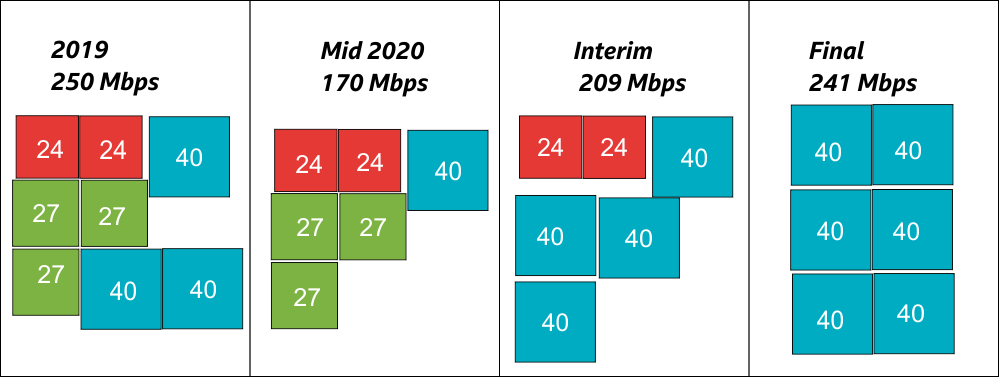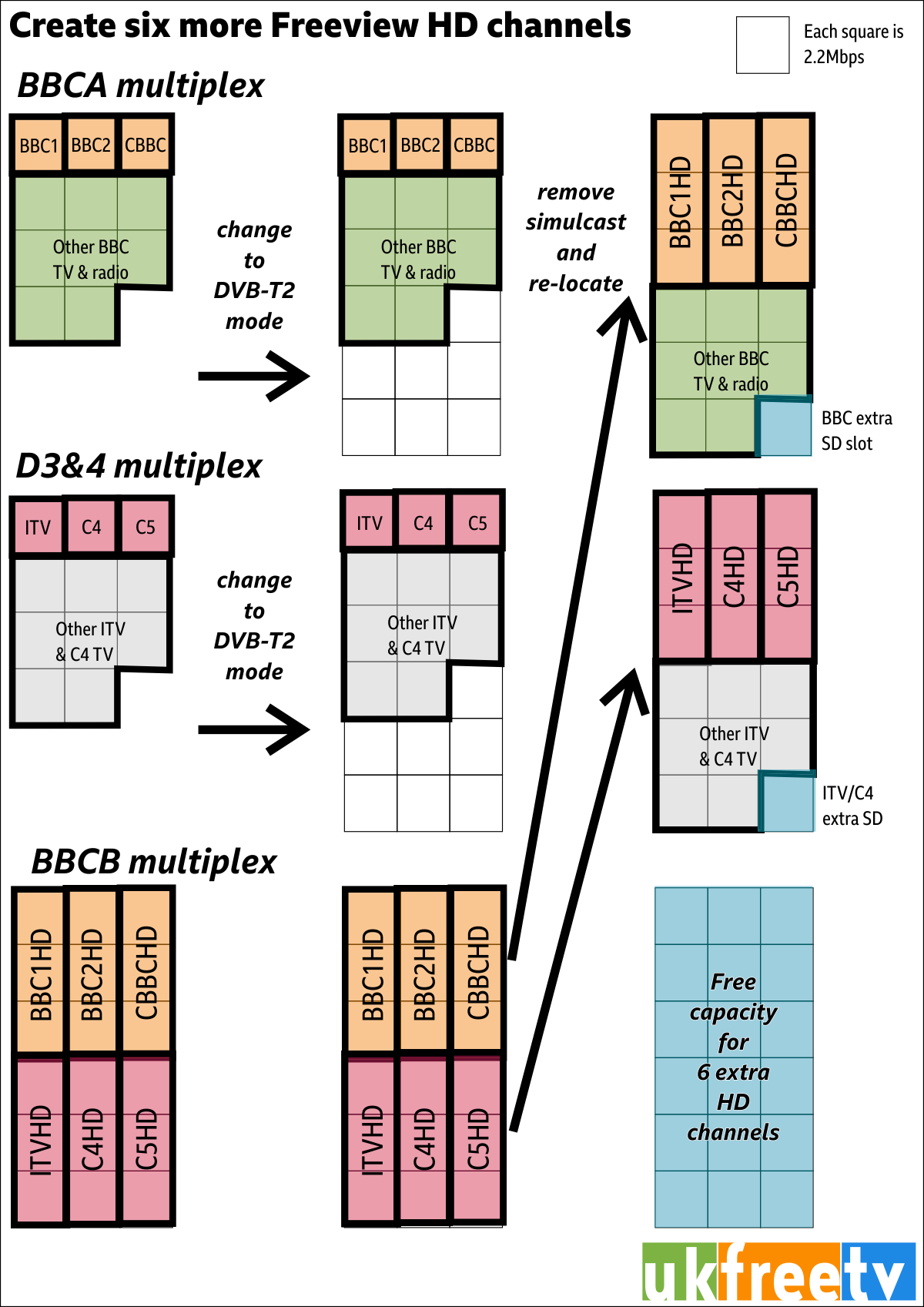Rebuilding Freeview High Definition from 2019 onwards

As Freeview High Definition users in Cornwall already know, the number of TV channels being broadcast in the UK will be cut back in mid-2020 to make way for the fifth generation of mobile phone data services.
This is because the number of multiplexes being broadcast will be cut back to the original six. The extra two were provided as a “interim service”. A Freeview multiplex is a single broadcast of binary data that occupies a 8MHz frequency range. In the UK each of these can carry 24.1, 27.1 or 40.2Mbps or of data.
Because older TV sets and set-top boxes can only work with 24.1 Mbps, it is only possible for the owners of the multiplexes to use the higher capacity modes when every home has switched to Freeview HD capable equipment. This equipment is marked with “DVB-T2”.
As illustrated, the total bitrate (in a home that can receive all the multiplexes) will change over time.

Meet the multiplexes
Not all the multiplexes are the same:
- only three are broadcast to the whole of the UK;
- a different three are broadcast in the better DVB-T2 mode;
- legally, only BBC channels may appear on BBCA
- also, legally, only public service broadcast channels (ITV, C4, C5) can appear on D3&4
- The HD mode multiplexes have more bits and use a more video efficient encoding system (MPEG-4)
- The current license to broadcast have different end-dates
This can be summaries in this table.
|
Multiplex name |
Expires |
HD mode? |
Coverage |
Mode |
Bitrate today |
||
|
com7 |
21 June 2020 |
Yes |
76% |
6 |
40.2 |
||
|
com8 |
21 June 2020 |
Yes |
76% |
6 |
40.2 |
||
|
D3&4 |
15 November 2022 |
No |
100% |
3 |
24.1 |
||
|
ARQA |
15 November 2026 |
No |
90% |
8 |
27.1 |
||
|
ARQB |
15 November 2026 |
No |
90% |
8 |
27.1 |
||
|
SDN |
15 November 2026 |
No |
90% |
8 |
27.1 |
||
|
BBCB |
16 November 2026 |
Yes |
100% |
6 |
40.2 |
||
|
BBCA |
31 December 2027 |
No |
100% |
3 |
24.1 |
Freeview requires about 2.2Mbps for a standard definition channels and three times that for a high definition one (6.7Mbps).
The Freeview HD EPG problem
One problem for people with Freeview HD receivers will note is that HD channels are grouped together in the program guide, rather than appear as replacements for the standard definition channels as viewers expect. This is because the six channels on the BBCB multiplex (BBC One, BBC Two, CBBC, ITV, Channel 4 and Channel 5) can only be seen on newer boxes, making channel number replacement impossible without breaking the oldest Freeview equipment.
Basically the UK-wide BBCA and D3&4 multiplexes can’t change mode until ALL homes can receive them.
The interim position
There is good news, however, for the SDN, ARQA and ARQB multiplexes. They can switch modes to the high definition whenever they feel that it is commercially practical. This might be at a lower level of Freeview HD box use, perhaps 80% or 90%.
By switching to DVB-T2 mode, each of them can increase their capacity from 27.1 to 40.2Mbps and take advantage of MPEG4.
.png)
So, of the 80Mbps lost when com7 and com8 close, half of that can be got back by SDN, ARQA and ARQB upgrading, which would be enough for an extra 6 full HD services.
The HD public service channels
This diagram explains what will happen to create space six more Freeview HD channels.

The gains for the BBC when everyone has a DVB-T2 receiver are larger. It will:
- No longer need half of the capacity on the BBCB multiplex (20.1Mbps) as it can move these channels to BBCA
- Gain 16.1 Mbps on BBCA due to the mode change;
- Gain 6.6 Mbps from not simulcasting three services in SD and HD
- Use the “gained 22.1Mbps” Be able to supply all the BBC television channels in HD to all UK homes
For the D3&4 multiplex, the gains are similar:
- No longer need the 20.1Mbps on BBCB, making it available for other UK-wide services.
- Gain 16.1 Mbps on D3&4 due to the mode change;
- Gain 6.6 Mbps from not simulcasting three services in SD and HD
- Be able to broadcast ITV, C4 and C5 in HD to all UK homes
I hope that's as clear as possible! Any qestions?
12:06 AM
Derby
Chris.SE:
Well, it's now a week since both COM7 and COM8 have been back every time I've checked!
Unfortunately, nothing has changed here, so I must assume the problem was caused by their engineering works.
Thanks for you comments - I'll carry on reading this site, but I hope I don't have any other problems!
By the way - I've been playing with the Humax Freeview Play box - when I set it up again, it updated the software, so I was quite optimistic. Unfortunately, although it is faster than before, it is still slow, and I'd still prefer YouView+.
Neither is as good to use as the old Humax models, but the modern trend is to have pretty pictures taking up lots of space on the screen, rather than s simple text list of recordings, etc., which crams far more information into a smaller space.
But, as Marketing people would put it, this is the" New Improved system"!
Regards,
Bob B.
| link to this comment |
Bob's: mapB's Freeview map terrainB's terrain plot wavesB's frequency data B's Freeview Detailed Coverage
12:24 AM
Bob B:
Glad it's all working OK now then Bob, let's hope things remain stable.
As for Marketing people, they always say things like that, generally without having a clue :o
| link to this comment |
8:22 PM
MikeP: That's not the reason that local content is not carried in HD.
The HD playout is only available on Nations not regions. So Wales, Northern Ireland and Scotland *do* get their own regional content in HD including local news.
However, there are no regional variations for HD in England and the entire English BBC HD playout is a single BBCB mux feed from Crystal Palace. If the channels were fixed bit rates, the local regions could switch their single fixed bit rate channel the MUX to their local feed (rather than the crystal palace feed) exactly like they used to do in the days of fixed bit rate SD channels for Wales, Northern Ireland and Scotland. However, they can't do that with stat muxed channels because the bit rate is transient and depends on the instantaneous bit rate of all the other channels carried by that mux.
| link to this comment |
9:03 PM
Simon Watkins:
I can't see where MikeP's post is to which you refer. Can you mention where it is please?
| link to this comment |
12:20 AM
Great article. So... technically, Freeview could support an all-HD future of 36 HD channels then if the owning parties had the balls to move to a "less channels, more quality" position! The French DTT service is streets ahead of us in this regard.
| link to this comment |
12:35 AM
Simon Watkins:
There are regional variations across the UK, but the briadcasters choose not to broadcast regional programming in HD as most studios are not yetr equipped with the necessary communications and studio equipment needed for HD transmission. I understand that the investment needed was delayed.
| link to this comment |
3:45 AM
Simon Watkins:
As MikeP say, there are some regional variations around, BUT it is broadcaster dependant it seems, based on my experience. It depends on where the feeds come from.
ITV have some regional variations, eg. if you watch ITV1 HD in the West, you'll get the Central News/Weather. I did somewhere see an explanation of how the ITV feeds are done.
BBC1 HD put up the silly caption when regional news and weather is broadcast.
BBC2 HD do have regional variations similar to BBC2 SD. BBC News SD/HD is London.
As far as Mike's comment about studio equipment goes, that's the excuse the BBC have put out, but as currently not all stuff on the HD channels is not in HD anyway it's just an excuse, but it is more to do with the "communications" - the way the transmitter feeds are done, altering that will cost them money.
| link to this comment |
12:27 AM
Chris.SE:
I have a relative who works for the BBC in a technical managerial role and my comment is based on what he tells me. They did have plans to equip all regional studios for HD but they realised it would be more expensive than originally thought. So some of the larger studios have been done but some smaller ones have not. Further, the data links for HD are more expensive too, apparently.
| link to this comment |
12:55 AM
MikeP:
Not disputing that, as I said it's an excuse, because as not all material broadcast (on HD channels) is HD, so that is no excuse for not sorting out the feeds. The data links might be more expensive, but as they have two lots of links going to the transmitters, they are wasting money. If they just provided HD feeds to replace the current SD feeds, they could get rid of the then redundant SD feeds. OK they'd need a bit of kit to downscale the HD for the SD muxes, but the saving on feeds should pay for that in time. Plus there are other ways the BBC could save money without cutting services or programmes etc. to help with this sort of investment.
| link to this comment |
9:39 PM
Chris.SE
I think you need to think it through more carefully, bearing in mind that many programmes are made in SD rather than HD and there is a regulator 'getting in the way'.
| link to this comment |
